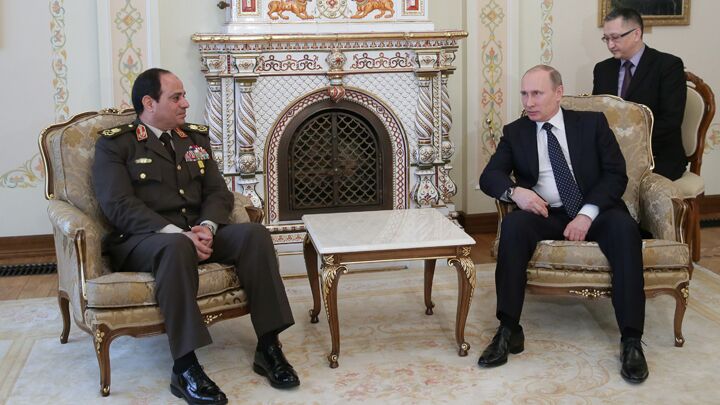
Middle East Replaces America With Russia
The fracturing relations between America and its Arabic allies have been highlighted by a recent arms deal for Egypt. The Egyptians, who have looked to America for weapons since the Camp David Peace Accords, now look for arms from the new dominant power in the region—Russia.
The military deal—worth an estimated $3 billion—was reportedly signed on February 14, according to Russian newspaper Vedomosti. The deal includes MiG-29 fighters, air and coastal defense systems, Mi-35 attack helicopters and small arms. Suggestions of a deal had been leaked before the Friday announcement when Egyptian Defense Minister Abdel Fattah al-Sisi—slated to be Egypt’s next president—flew to Russia to meet with Russian President Vladimir Putin.
The price tag attached to the military hardware is more than the ailing Egyptian economy can handle, but thankfully for Egypt, its Saudi neighbors have offered to foot the bill.
Saudi Arabia’s interest in funding the deal might seem confusing at first. After all, Egypt is buying the weapons from Russia, a long-time supporter of Iran and the Syrian government—Saudi’s opponents. There is a reason behind the move though. The Saudis—and Egyptians—are fed up with America.
Russia and America have a history of vying for control in the Middle East. The Russians supplied Egypt with weapons in the lead-up to the Six Day War, and still supply arms to a number of countries in the region. However, in recent years the U.S. has taken on a devastating new foreign policy in the region—a policy of distancing itself from its allies and embracing its enemies. The whirlwind romance between Iran and the U.S. for the past year epitomizes this trend. As America is busy establishing this relationship, it is abandoning others.
First, consider the campaign to befriend Hassan Rouhani. Swooning at the new president’s “charm offensive,” swept up in a media-induced stupor, the Obama administration did all it could to woo Iran’s new leader as it simultaneously ignored his not-so-moderate history. All the while, America’s long-term allies in the Middle East, particularly Saudi Arabia and Israel, were pleading for the U.S. to proceed with caution and avoid being duped by the Iranians.
The cries have fallen on deaf ears. President Obama is trying harder and harder to strengthen ties with the nation that repeatedly calls for the complete annihilation of the West.
Second, there was the Geneva deal. While some parties involved in the meeting were determined to use the talks to bring an end to Iran’s nuclear ambitions, it seems that neither the U.S. nor Iran went to the table with this goal in mind.
The result: Iran was given everything and gave nothing. More pleas by nations that recognize the danger of a nuclear-armed Iran fell on deaf ears, leaving America’s old allies questioning Washington’s motives all the more.
Another overarching policy America has been enacting is that of withdrawal. Of all America’s destructive Mideast policies, this is one that undoubtedly worries Saudi Arabia and Egypt the most.
While America is systematically withdrawing troops and minimizing its military presence, it is increasingly calling for peace and democracy throughout the region. As a result, Iran is being empowered, allowing terrorism throughout the region to grow relatively unchecked.
So now, after all these disastrous policies, America has been given a vote of “no confidence” by its allies in Egypt and Saudi Arabia.
Egypt no longer trusts America. Ever since the July 3 coup when the Egyptian military overthrew the Muslim Brotherhood, relations between Cairo and Washington have been sour. The Obama administration was a strong supporter of the democratically elected Mohamed Morsi and his radical Brotherhood regime. When he was overthrown, the U.S. held back part of its military aid packages to Egypt, causing an instantaneous rift with Egyptian Army officials.
As the Jerusalem Post reported, “The United States appears unaware of the fact that by pressuring the new regime in Cairo to demonstrate its commitment to democracy it is driving it straight into the willing embrace of one of the least democratic countries in Europe.”
The $3 billion deal between Russia and Egypt, funded by Saudi Arabia, is one of the clearest signs that America’s allies do not trust Washington anymore. Why would Egypt buy Russian military hardware after receiving so much American technology over the past decade? Why would the Saudis pay a nation that supports their archenemy in order to fund the military in Egypt? Nobody trusts America to counter Iran, so they are doing it themselves.
But neither do the Saudis, Egyptians or any nation on Earth trust God to fulfill His Word. The Saudis can fund Egypt all they want, but God says Egypt will eventually ally with the very nation that the Saudis are trying to counter!
Daniel 11:42 states: “He shall stretch forth his hand also upon the countries: and the land of Egypt shall not escape.” As Trumpet editor in chief Gerald Flurry writes in his booklet The King of the South, “Daniel 11:42 implies that Egypt will be allied with the king of the south, or Iran. This prophecy indicated there would be a far-reaching change in Egyptian politics!” (This booklet explains the identities of Iran and its adversaries in detail.)
While the specifics of how this alliance will form remain unknown, Egypt turning to Russia for help, rather than America, is a clear sign of the fracturing ties America holds to the Mideast. It is also a sign of more radical alliances spreading across the land.
Keep watching events in the Middle East, as America loses its friends, empowers its enemies, and helps hasten the fulfillment of many prophecies for the region.
